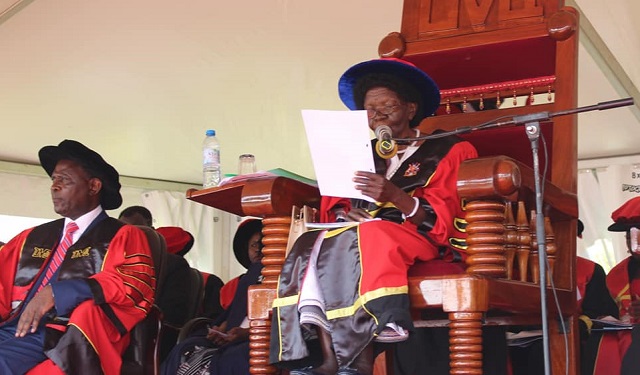
Kampala, Uganda | THE INDEPENDENT | Uganda Management Institute-UMI is designing training modules for addressing poor work ethics, rampant corruption and accountability issues in civil service in Uganda. The training modules will also address concerns of integrity, efficacy and commitment of civil servants in fostering national development.
The UMI Vice Chancellor, Geraldine Namirembe Bitamazire, says the modules are being developed in response to the growing need and increasing demand for skillful, efficient and committed managers, leaders and administrators.
She says the human resource is required to manage the rapid and multiple socio-economic and political changes in the country to drive the national development and growth programs in the public and private sector.
Bitamazire was speaking at UMI’s 16th graduation of the institute Branch in Gulu on Friday where 197 students graduated in various disciplines including post graduate diploma in financial management, project planning and management.
Others are post graduate diploma in public administration and management, Human resource development and management among others.
Five best students won plagues for post graduate diploma in human Resource Management, Financial Management, Project Planning and Management, Monitoring and Evaluation and Public Administration and Management were awarded for exceptional performances in the various disciplines.
77 of the graduates were female while 129 were males. Namirembe said the modules will be implemented alongside conventional courses and skilling modules in management, leadership and administrative disciplines.
“UMI wishes to assure government of her sustainable and continued support to policies and programs targeting building and development of management capacities to drive Uganda to a middle income status,” she stated. According to Bitamazire, they expect government to provide the necessary financial and material resources for implementing the required training programs.
Dr James L. Nkata, the Director General of Uganda Management Institute, says skilling the nation’s workforce with the required soft and hard skills will propel the country’s drive for a middle income status in the challenging environments. “Soft skills such as strong work ethics and accountability, communication skills, creative problem solving, time management, teamwork, leadership, flexibility and adaptability as well as branding and marketing” he stated.
Nkata said the institute has begun emphasizing community social responsibility to students. He said the institute is seeking 65 Billion Shillings to expand its infrastructure to a 14 floor complex equipped with the country’s first digital library amongst others.
The former Speaker of the East African Legislative Assembly, Dan Kidega underscored the significance of skilling the nation’s workforce with the requisite technical skills.
Kidega said liberalization of the East African job market calls for robust changes in the country’s tertiary education curriculum in order to produce regionally competitive graduates.
“Until recently, graduates from most of Uganda’s leading tertiary institutions have been selling very highly in regional markets. There is need to improve the quality of tertiary education to bridge emerging gaps which prompted the recent concerns for the nation’s workforce to compete regionally,” Kidega said.
Kidega urged the institute to consider building capacity of lower technicians in public service to complement the highly skilled graduates they are producing.
***
URN
 The Independent Uganda: You get the Truth we Pay the Price
The Independent Uganda: You get the Truth we Pay the Price



